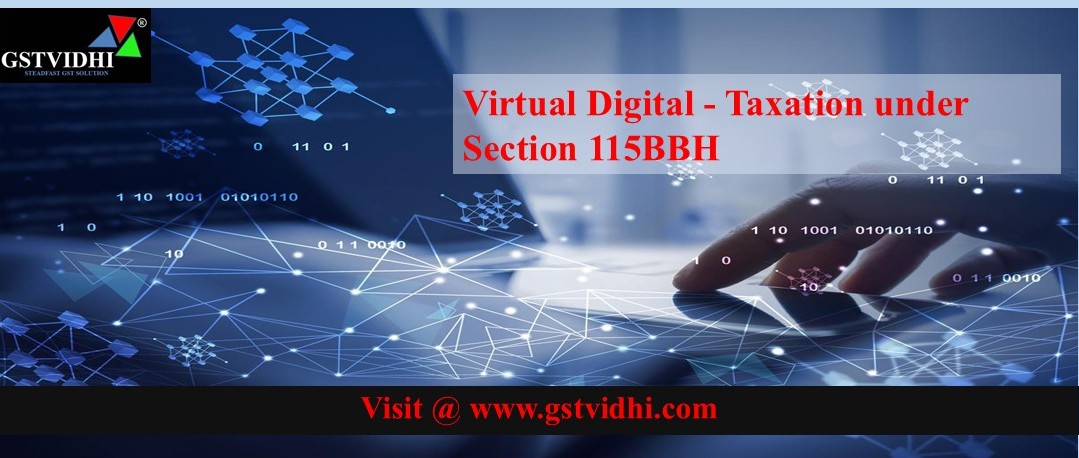
Tax on Income from Virtual Digital Assets and Set-Off of Losses
- Taxation under Section 115BBH
Introduction
With the increasing
popularity of cryptocurrencies, NFTs, and other digital assets, the Government
of India introduced Section 115BBH under the Finance Act, 2022 to
regulate and tax income arising from Virtual Digital Assets (VDAs). This
section provides clarity on how income from these assets will be taxed and also
puts specific restrictions on the set-off and carry-forward of losses.
This article explains the
tax treatment of income from virtual digital assets and the restrictions placed
on set-off of losses.
What Are
Virtual Digital Assets (VDAs)?
Virtual Digital Assets
are digital assets that exist electronically and have value. These typically
include:
- Cryptocurrencies
like Bitcoin and Ethereum
- Non-Fungible Tokens (NFTs)
- Other blockchain-based tokens
used for investment or trading
Digital gold, CBDCs
(Central Bank Digital Currency), and other traditional digital assets are not
included in this definition.
Taxation
under Section 115BBH
As per Section 115BBH,
income from the transfer of any virtual digital asset is taxed at a flat
rate of 30%. This tax applies to all types of transfers, whether the asset
is sold for cash, exchanged with another crypto, or used to purchase goods or
services.
Taxable
Events Under VDAs Include:
1. Conversion
of a digital asset to INR or any other fiat currency
2. Crypto-to-crypto
exchange, such as swapping Bitcoin for Ethereum
3. Payment
using VDAs to buy goods or services
In addition to the 30%
tax rate, applicable surcharges and cess (currently 4%) will also
be levied.
Key
Provisions of Section 115BBH
1. Flat Tax Rate on
Crypto Gains
Income from VDAs will be
taxed at 30%, regardless of the investor's total income or tax slab.
2. No Deduction Allowed
Taxpayers cannot claim
any deductions for expenses incurred in earning income from VDAs, except the
cost of acquisition. This means:
- No deduction for mining expenses,
electricity costs, or platform fees
- Only the purchase cost can be reduced
while calculating gains
3. Loss Cannot Be Set-Off
Any loss from transfer
of a virtual digital asset cannot be set off:
- Against income from any other source
(e.g., salary, business, property, etc.)
- Against income from another VDA
(e.g., Bitcoin profit cannot be adjusted against Ethereum loss)
4. No Carry Forward of
Loss
Crypto-related losses cannot
be carried forward to future years. This means if you incur a loss in one
year, you cannot claim it in the next year to reduce tax liability.
Example
(Illustrative Case)
Let’s understand with a
simple example:
Financial Year: 2024-25
- Transaction 1:
Bitcoin bought for ₹10,00,000 and sold for ₹11,00,000 → Profit: ₹1,00,000
- Transaction 2:
Ethereum bought for ₹5,00,000 and sold for ₹4,00,000 → Loss: ₹1,00,000
Although the investor
made an overall net gain of ₹1,00,000, the loss from Ethereum cannot be set off
against the Bitcoin profit.
As per Section 115BBH,
only the ₹1,00,000 Bitcoin gain will be considered for tax.
Tax at 30% on ₹1,00,000 = ₹30,000 (plus surcharge and cess)
Conclusion
The introduction of
Section 115BBH marks a significant shift in the way digital assets are taxed in
India. While the 30% tax rate is straightforward, the prohibition on setting
off losses or claiming deductions makes investing in VDAs less favorable
from a tax-saving perspective.
Investors and traders
must plan their transactions wisely and ensure compliance with the law to avoid
any penalties. In short, profits from virtual digital assets are taxable,
but losses are not adjustable or carry-forwardable — making it a one-way
tax treatment.
Disclaimer: All the Information is based on the notification, circular advisory and order issued by the Govt. authority and judgement delivered by the court or the authority information is strictly for educational purposes and on the basis of our best understanding of laws & not binding on anyone.
Click here